Transformational and Charismatic Leadership of Nelson Mandela
VerifiedAdded on 2020/05/16
|6
|1498
|362
Essay
AI Summary
This essay provides an in-depth analysis of Nelson Mandela's leadership, examining his impact on South Africa and the world. It explores his role as an anti-apartheid revolutionary, philanthropist, and politician, focusing on his presidency from 1994 to 1999. The essay highlights Mandela's commitment to nonviolent resistance, influenced by Mohandas Karamchand Gandhi, and his strong personality traits, including emotional stability, agreeableness, and extraversion. It delves into how he managed his emotions, demonstrating forgiveness and thoughtful expression of opinions. The essay further investigates Mandela's charismatic and transformational leadership styles, illustrating how he motivated followers, created a vision, and initiated positive change. It discusses how his actions inspired others, emphasizing his communication skills and ability to unite people for the benefit of all. The essay concludes by summarizing Mandela's qualities as both a charismatic and transformational leader, drawing parallels between his practices and the characteristics of these leadership styles, supported by references to key leadership theories and relevant academic sources.
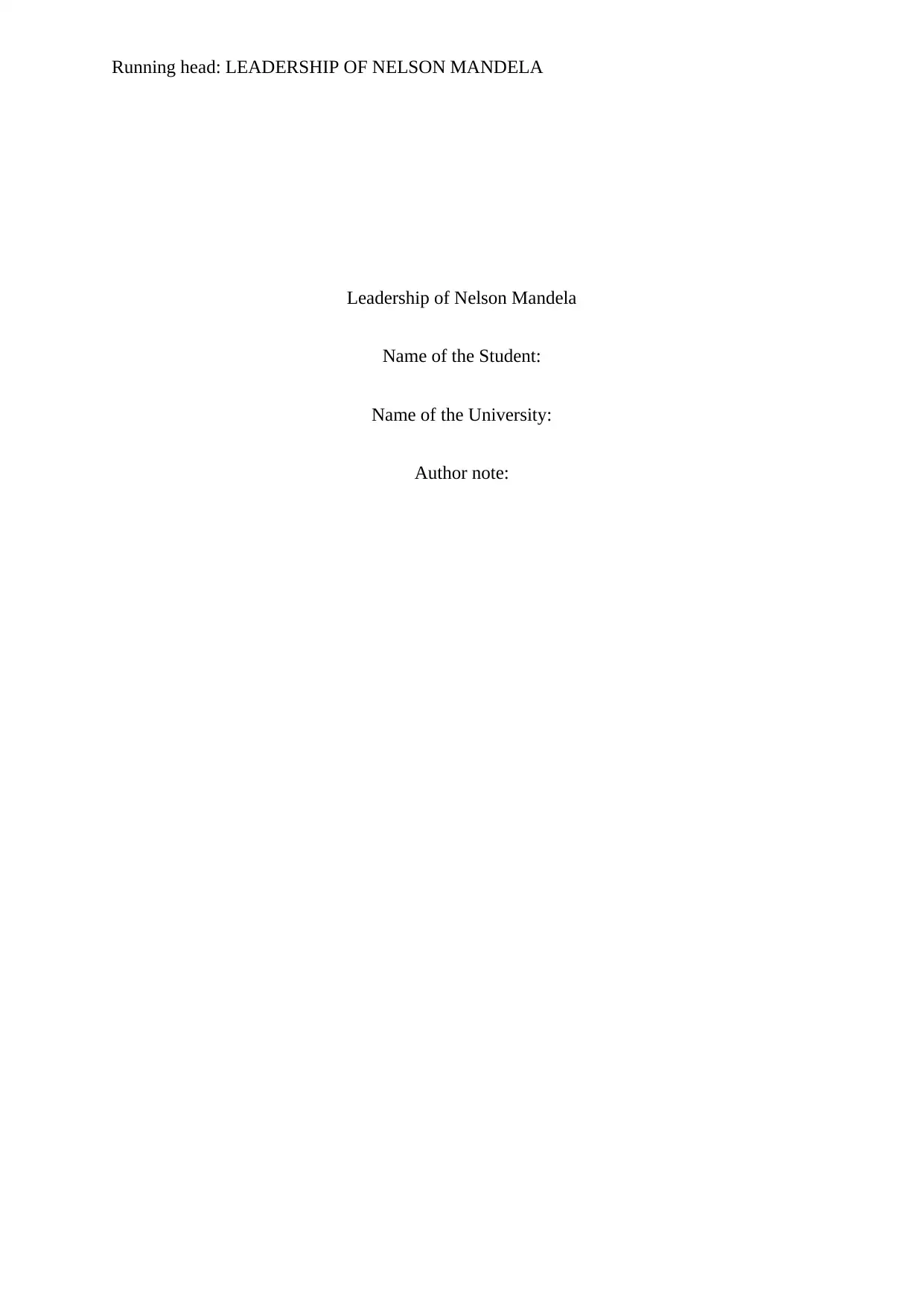
Running head: LEADERSHIP OF NELSON MANDELA
Leadership of Nelson Mandela
Name of the Student:
Name of the University:
Author note:
Leadership of Nelson Mandela
Name of the Student:
Name of the University:
Author note:
Paraphrase This Document
Need a fresh take? Get an instant paraphrase of this document with our AI Paraphraser
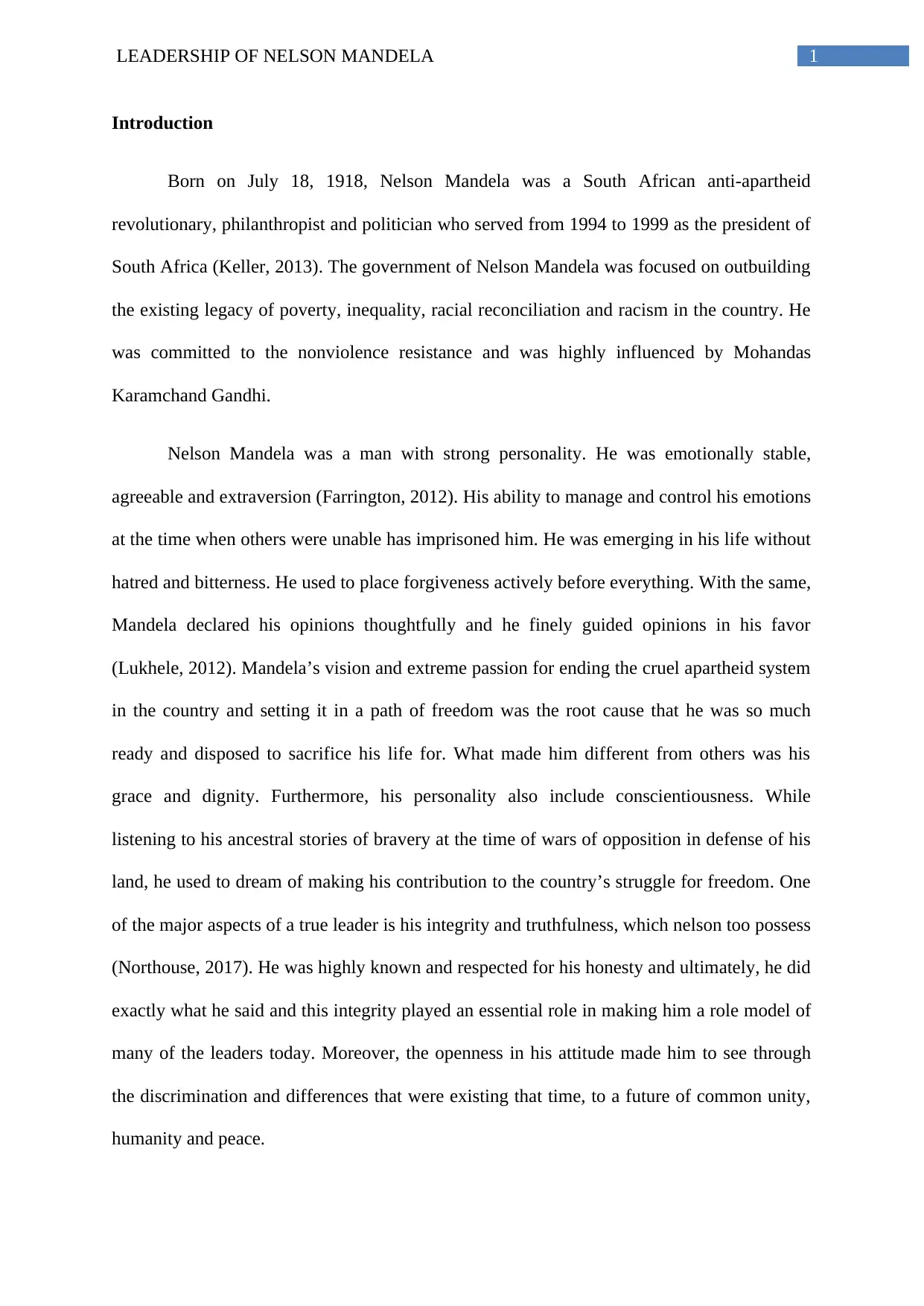
1LEADERSHIP OF NELSON MANDELA
Introduction
Born on July 18, 1918, Nelson Mandela was a South African anti-apartheid
revolutionary, philanthropist and politician who served from 1994 to 1999 as the president of
South Africa (Keller, 2013). The government of Nelson Mandela was focused on outbuilding
the existing legacy of poverty, inequality, racial reconciliation and racism in the country. He
was committed to the nonviolence resistance and was highly influenced by Mohandas
Karamchand Gandhi.
Nelson Mandela was a man with strong personality. He was emotionally stable,
agreeable and extraversion (Farrington, 2012). His ability to manage and control his emotions
at the time when others were unable has imprisoned him. He was emerging in his life without
hatred and bitterness. He used to place forgiveness actively before everything. With the same,
Mandela declared his opinions thoughtfully and he finely guided opinions in his favor
(Lukhele, 2012). Mandela’s vision and extreme passion for ending the cruel apartheid system
in the country and setting it in a path of freedom was the root cause that he was so much
ready and disposed to sacrifice his life for. What made him different from others was his
grace and dignity. Furthermore, his personality also include conscientiousness. While
listening to his ancestral stories of bravery at the time of wars of opposition in defense of his
land, he used to dream of making his contribution to the country’s struggle for freedom. One
of the major aspects of a true leader is his integrity and truthfulness, which nelson too possess
(Northouse, 2017). He was highly known and respected for his honesty and ultimately, he did
exactly what he said and this integrity played an essential role in making him a role model of
many of the leaders today. Moreover, the openness in his attitude made him to see through
the discrimination and differences that were existing that time, to a future of common unity,
humanity and peace.
Introduction
Born on July 18, 1918, Nelson Mandela was a South African anti-apartheid
revolutionary, philanthropist and politician who served from 1994 to 1999 as the president of
South Africa (Keller, 2013). The government of Nelson Mandela was focused on outbuilding
the existing legacy of poverty, inequality, racial reconciliation and racism in the country. He
was committed to the nonviolence resistance and was highly influenced by Mohandas
Karamchand Gandhi.
Nelson Mandela was a man with strong personality. He was emotionally stable,
agreeable and extraversion (Farrington, 2012). His ability to manage and control his emotions
at the time when others were unable has imprisoned him. He was emerging in his life without
hatred and bitterness. He used to place forgiveness actively before everything. With the same,
Mandela declared his opinions thoughtfully and he finely guided opinions in his favor
(Lukhele, 2012). Mandela’s vision and extreme passion for ending the cruel apartheid system
in the country and setting it in a path of freedom was the root cause that he was so much
ready and disposed to sacrifice his life for. What made him different from others was his
grace and dignity. Furthermore, his personality also include conscientiousness. While
listening to his ancestral stories of bravery at the time of wars of opposition in defense of his
land, he used to dream of making his contribution to the country’s struggle for freedom. One
of the major aspects of a true leader is his integrity and truthfulness, which nelson too possess
(Northouse, 2017). He was highly known and respected for his honesty and ultimately, he did
exactly what he said and this integrity played an essential role in making him a role model of
many of the leaders today. Moreover, the openness in his attitude made him to see through
the discrimination and differences that were existing that time, to a future of common unity,
humanity and peace.
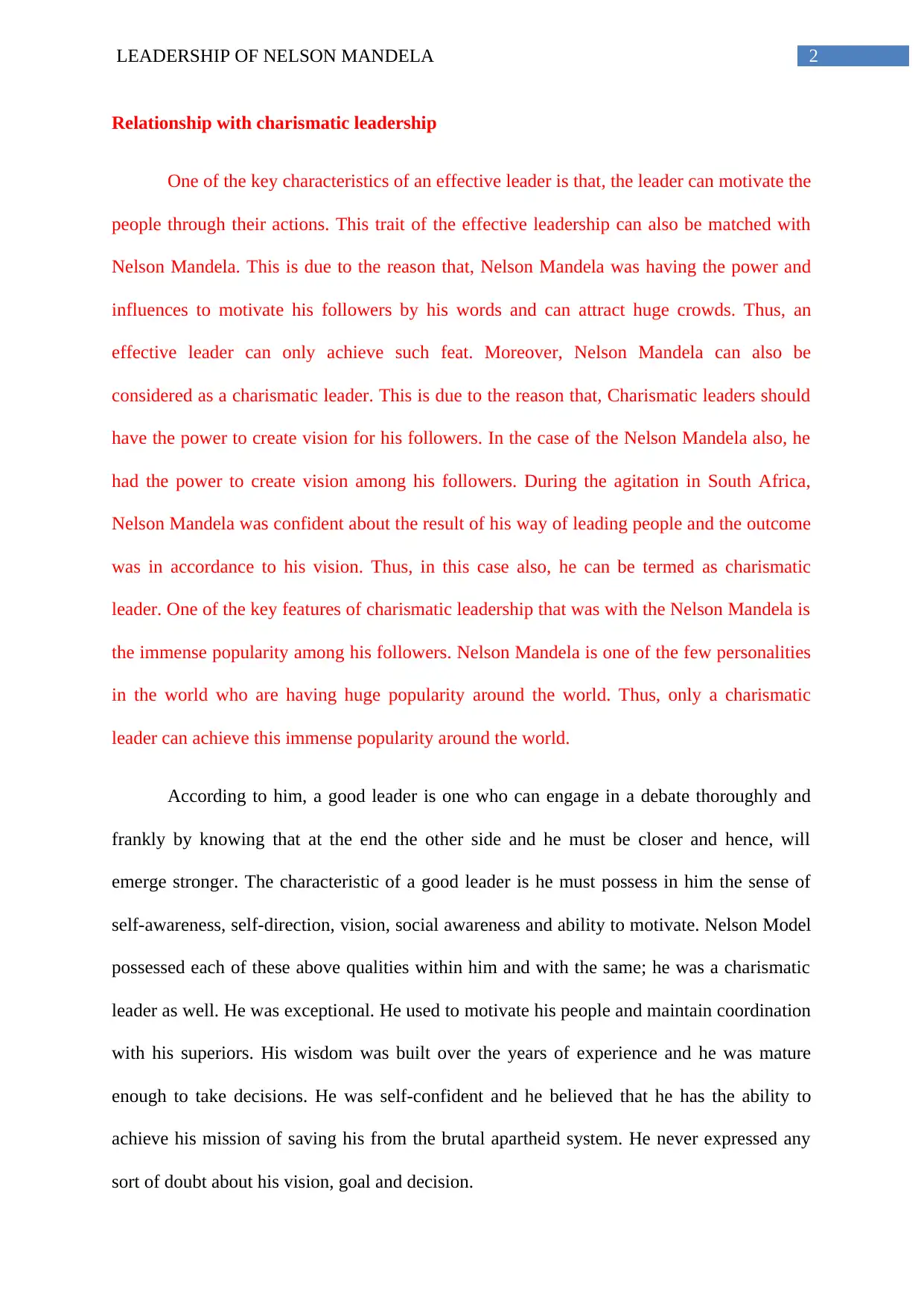
2LEADERSHIP OF NELSON MANDELA
Relationship with charismatic leadership
One of the key characteristics of an effective leader is that, the leader can motivate the
people through their actions. This trait of the effective leadership can also be matched with
Nelson Mandela. This is due to the reason that, Nelson Mandela was having the power and
influences to motivate his followers by his words and can attract huge crowds. Thus, an
effective leader can only achieve such feat. Moreover, Nelson Mandela can also be
considered as a charismatic leader. This is due to the reason that, Charismatic leaders should
have the power to create vision for his followers. In the case of the Nelson Mandela also, he
had the power to create vision among his followers. During the agitation in South Africa,
Nelson Mandela was confident about the result of his way of leading people and the outcome
was in accordance to his vision. Thus, in this case also, he can be termed as charismatic
leader. One of the key features of charismatic leadership that was with the Nelson Mandela is
the immense popularity among his followers. Nelson Mandela is one of the few personalities
in the world who are having huge popularity around the world. Thus, only a charismatic
leader can achieve this immense popularity around the world.
According to him, a good leader is one who can engage in a debate thoroughly and
frankly by knowing that at the end the other side and he must be closer and hence, will
emerge stronger. The characteristic of a good leader is he must possess in him the sense of
self-awareness, self-direction, vision, social awareness and ability to motivate. Nelson Model
possessed each of these above qualities within him and with the same; he was a charismatic
leader as well. He was exceptional. He used to motivate his people and maintain coordination
with his superiors. His wisdom was built over the years of experience and he was mature
enough to take decisions. He was self-confident and he believed that he has the ability to
achieve his mission of saving his from the brutal apartheid system. He never expressed any
sort of doubt about his vision, goal and decision.
Relationship with charismatic leadership
One of the key characteristics of an effective leader is that, the leader can motivate the
people through their actions. This trait of the effective leadership can also be matched with
Nelson Mandela. This is due to the reason that, Nelson Mandela was having the power and
influences to motivate his followers by his words and can attract huge crowds. Thus, an
effective leader can only achieve such feat. Moreover, Nelson Mandela can also be
considered as a charismatic leader. This is due to the reason that, Charismatic leaders should
have the power to create vision for his followers. In the case of the Nelson Mandela also, he
had the power to create vision among his followers. During the agitation in South Africa,
Nelson Mandela was confident about the result of his way of leading people and the outcome
was in accordance to his vision. Thus, in this case also, he can be termed as charismatic
leader. One of the key features of charismatic leadership that was with the Nelson Mandela is
the immense popularity among his followers. Nelson Mandela is one of the few personalities
in the world who are having huge popularity around the world. Thus, only a charismatic
leader can achieve this immense popularity around the world.
According to him, a good leader is one who can engage in a debate thoroughly and
frankly by knowing that at the end the other side and he must be closer and hence, will
emerge stronger. The characteristic of a good leader is he must possess in him the sense of
self-awareness, self-direction, vision, social awareness and ability to motivate. Nelson Model
possessed each of these above qualities within him and with the same; he was a charismatic
leader as well. He was exceptional. He used to motivate his people and maintain coordination
with his superiors. His wisdom was built over the years of experience and he was mature
enough to take decisions. He was self-confident and he believed that he has the ability to
achieve his mission of saving his from the brutal apartheid system. He never expressed any
sort of doubt about his vision, goal and decision.
⊘ This is a preview!⊘
Do you want full access?
Subscribe today to unlock all pages.

Trusted by 1+ million students worldwide
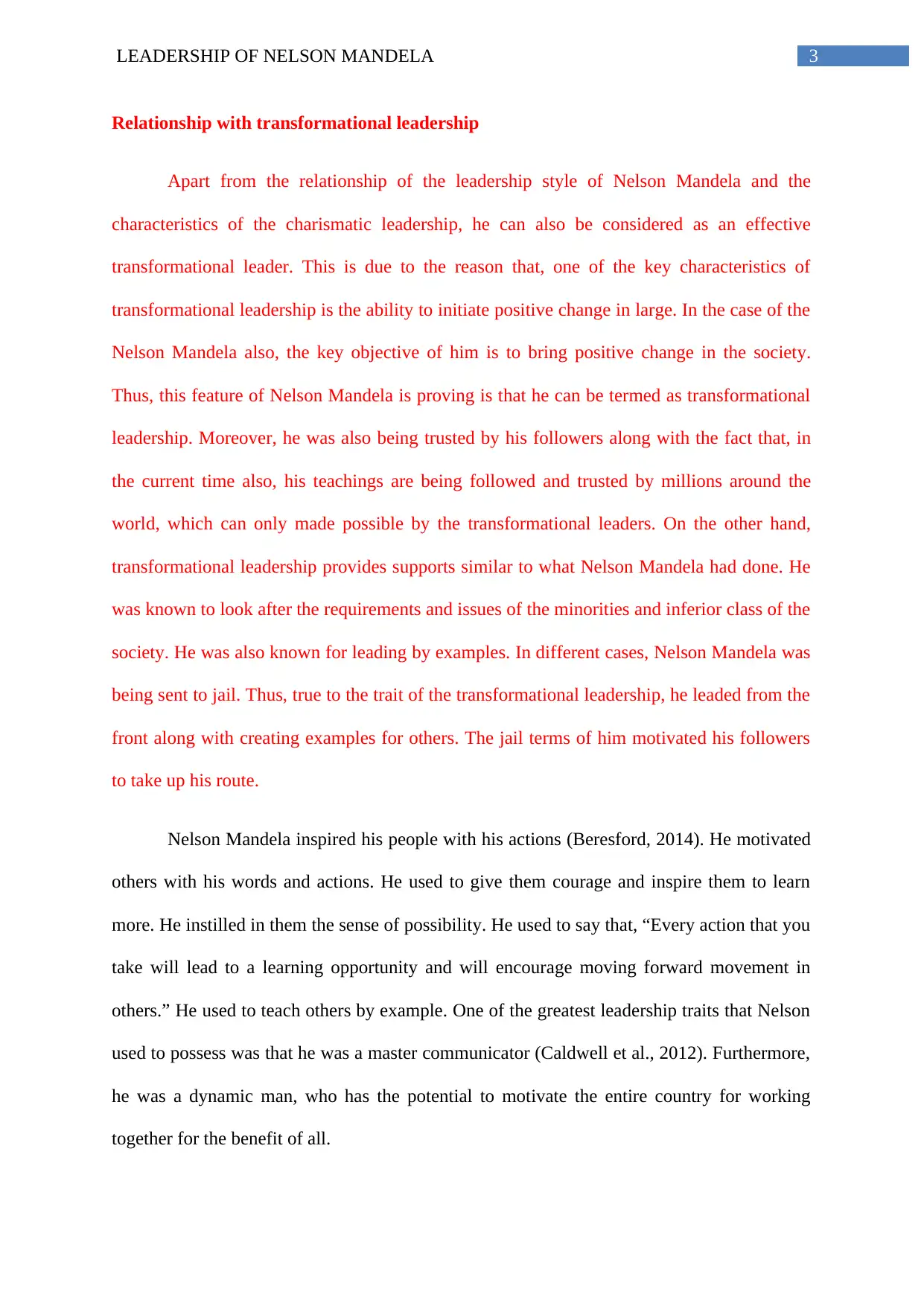
3LEADERSHIP OF NELSON MANDELA
Relationship with transformational leadership
Apart from the relationship of the leadership style of Nelson Mandela and the
characteristics of the charismatic leadership, he can also be considered as an effective
transformational leader. This is due to the reason that, one of the key characteristics of
transformational leadership is the ability to initiate positive change in large. In the case of the
Nelson Mandela also, the key objective of him is to bring positive change in the society.
Thus, this feature of Nelson Mandela is proving is that he can be termed as transformational
leadership. Moreover, he was also being trusted by his followers along with the fact that, in
the current time also, his teachings are being followed and trusted by millions around the
world, which can only made possible by the transformational leaders. On the other hand,
transformational leadership provides supports similar to what Nelson Mandela had done. He
was known to look after the requirements and issues of the minorities and inferior class of the
society. He was also known for leading by examples. In different cases, Nelson Mandela was
being sent to jail. Thus, true to the trait of the transformational leadership, he leaded from the
front along with creating examples for others. The jail terms of him motivated his followers
to take up his route.
Nelson Mandela inspired his people with his actions (Beresford, 2014). He motivated
others with his words and actions. He used to give them courage and inspire them to learn
more. He instilled in them the sense of possibility. He used to say that, “Every action that you
take will lead to a learning opportunity and will encourage moving forward movement in
others.” He used to teach others by example. One of the greatest leadership traits that Nelson
used to possess was that he was a master communicator (Caldwell et al., 2012). Furthermore,
he was a dynamic man, who has the potential to motivate the entire country for working
together for the benefit of all.
Relationship with transformational leadership
Apart from the relationship of the leadership style of Nelson Mandela and the
characteristics of the charismatic leadership, he can also be considered as an effective
transformational leader. This is due to the reason that, one of the key characteristics of
transformational leadership is the ability to initiate positive change in large. In the case of the
Nelson Mandela also, the key objective of him is to bring positive change in the society.
Thus, this feature of Nelson Mandela is proving is that he can be termed as transformational
leadership. Moreover, he was also being trusted by his followers along with the fact that, in
the current time also, his teachings are being followed and trusted by millions around the
world, which can only made possible by the transformational leaders. On the other hand,
transformational leadership provides supports similar to what Nelson Mandela had done. He
was known to look after the requirements and issues of the minorities and inferior class of the
society. He was also known for leading by examples. In different cases, Nelson Mandela was
being sent to jail. Thus, true to the trait of the transformational leadership, he leaded from the
front along with creating examples for others. The jail terms of him motivated his followers
to take up his route.
Nelson Mandela inspired his people with his actions (Beresford, 2014). He motivated
others with his words and actions. He used to give them courage and inspire them to learn
more. He instilled in them the sense of possibility. He used to say that, “Every action that you
take will lead to a learning opportunity and will encourage moving forward movement in
others.” He used to teach others by example. One of the greatest leadership traits that Nelson
used to possess was that he was a master communicator (Caldwell et al., 2012). Furthermore,
he was a dynamic man, who has the potential to motivate the entire country for working
together for the benefit of all.
Paraphrase This Document
Need a fresh take? Get an instant paraphrase of this document with our AI Paraphraser

4LEADERSHIP OF NELSON MANDELA
Conclusion
Thus, from the above discussion, it can be concluded that, Nelson Mandela can be
termed as both charismatic and transformational leaders. In the above discussion, various
characteristics of both the leadership styles are being analyzed in view of the leadership styles
being followed by him. It is being seen that, various qualities of both the charismatic and
transformational leadership are similar to that of the qualities being practiced by Nelson
Mandela.
Conclusion
Thus, from the above discussion, it can be concluded that, Nelson Mandela can be
termed as both charismatic and transformational leaders. In the above discussion, various
characteristics of both the leadership styles are being analyzed in view of the leadership styles
being followed by him. It is being seen that, various qualities of both the charismatic and
transformational leadership are similar to that of the qualities being practiced by Nelson
Mandela.
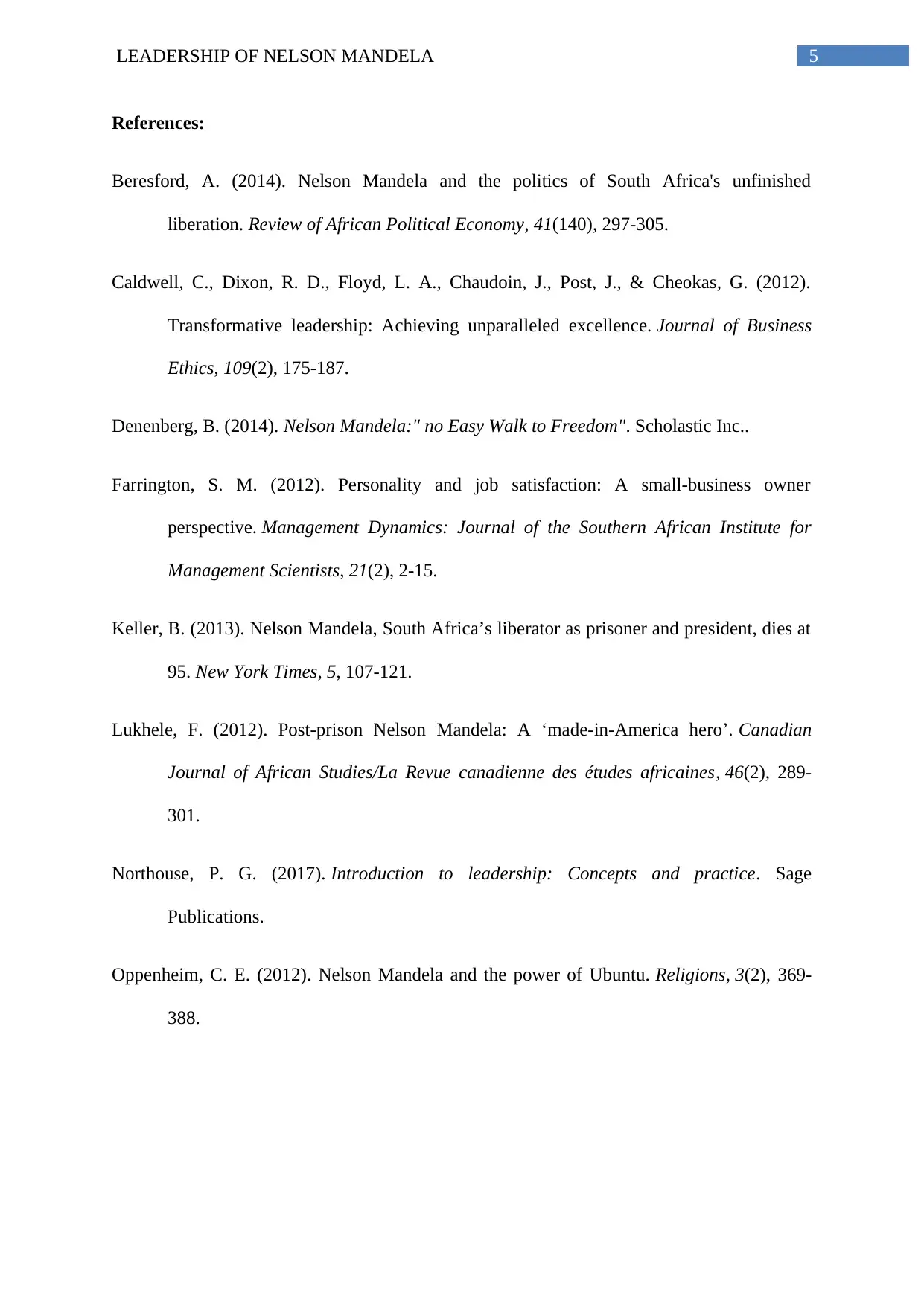
5LEADERSHIP OF NELSON MANDELA
References:
Beresford, A. (2014). Nelson Mandela and the politics of South Africa's unfinished
liberation. Review of African Political Economy, 41(140), 297-305.
Caldwell, C., Dixon, R. D., Floyd, L. A., Chaudoin, J., Post, J., & Cheokas, G. (2012).
Transformative leadership: Achieving unparalleled excellence. Journal of Business
Ethics, 109(2), 175-187.
Denenberg, B. (2014). Nelson Mandela:" no Easy Walk to Freedom". Scholastic Inc..
Farrington, S. M. (2012). Personality and job satisfaction: A small-business owner
perspective. Management Dynamics: Journal of the Southern African Institute for
Management Scientists, 21(2), 2-15.
Keller, B. (2013). Nelson Mandela, South Africa’s liberator as prisoner and president, dies at
95. New York Times, 5, 107-121.
Lukhele, F. (2012). Post-prison Nelson Mandela: A ‘made-in-America hero’. Canadian
Journal of African Studies/La Revue canadienne des études africaines, 46(2), 289-
301.
Northouse, P. G. (2017). Introduction to leadership: Concepts and practice. Sage
Publications.
Oppenheim, C. E. (2012). Nelson Mandela and the power of Ubuntu. Religions, 3(2), 369-
388.
References:
Beresford, A. (2014). Nelson Mandela and the politics of South Africa's unfinished
liberation. Review of African Political Economy, 41(140), 297-305.
Caldwell, C., Dixon, R. D., Floyd, L. A., Chaudoin, J., Post, J., & Cheokas, G. (2012).
Transformative leadership: Achieving unparalleled excellence. Journal of Business
Ethics, 109(2), 175-187.
Denenberg, B. (2014). Nelson Mandela:" no Easy Walk to Freedom". Scholastic Inc..
Farrington, S. M. (2012). Personality and job satisfaction: A small-business owner
perspective. Management Dynamics: Journal of the Southern African Institute for
Management Scientists, 21(2), 2-15.
Keller, B. (2013). Nelson Mandela, South Africa’s liberator as prisoner and president, dies at
95. New York Times, 5, 107-121.
Lukhele, F. (2012). Post-prison Nelson Mandela: A ‘made-in-America hero’. Canadian
Journal of African Studies/La Revue canadienne des études africaines, 46(2), 289-
301.
Northouse, P. G. (2017). Introduction to leadership: Concepts and practice. Sage
Publications.
Oppenheim, C. E. (2012). Nelson Mandela and the power of Ubuntu. Religions, 3(2), 369-
388.
⊘ This is a preview!⊘
Do you want full access?
Subscribe today to unlock all pages.

Trusted by 1+ million students worldwide
1 out of 6
Related Documents
Your All-in-One AI-Powered Toolkit for Academic Success.
+13062052269
info@desklib.com
Available 24*7 on WhatsApp / Email
![[object Object]](/_next/static/media/star-bottom.7253800d.svg)
Unlock your academic potential
Copyright © 2020–2026 A2Z Services. All Rights Reserved. Developed and managed by ZUCOL.





